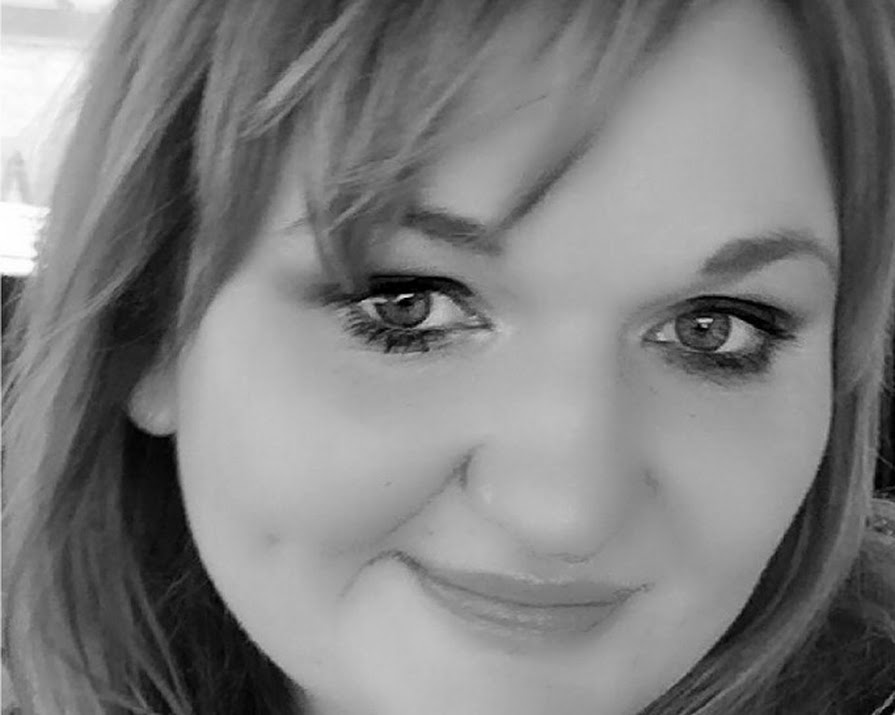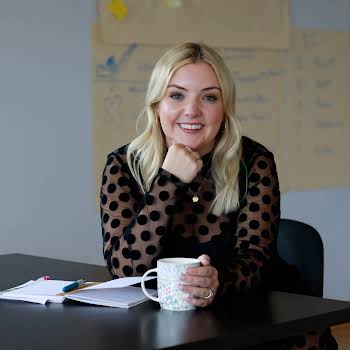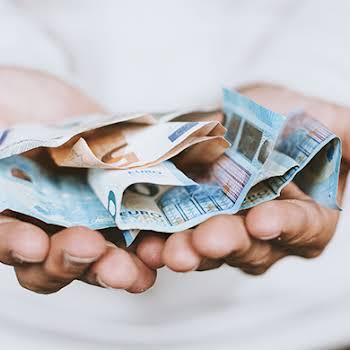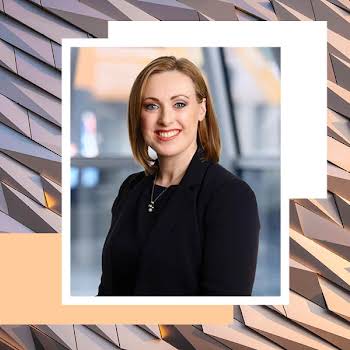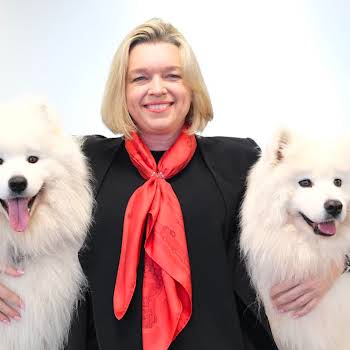By Laura Chabal
03rd Nov 2015
03rd Nov 2015
Kate Rowan is a successful Irish freelance sports journalist. She followed the recent Rugby World Cup in the United Kingdom to the nth degree and many enjoyed her take on this massively popular sporting event. Kate has co-written a book with Peter O’Reilly, the rugby correspondent of the Sunday Times, Entitled Six Nations, Two Stories, in which’she shares the women’s side of the rugby Six Nations. Kate brings light to the recent advances of the women’s Irish rugby team, highlighting the remarkable success that?Ireland has had in previous years with the Six Nations tournament, and shows the marked?’difference between the men’s professional set-up and lifestyle?and?the women’s amateur level. Ireland will be hosting the women’s Rugby World Cup in 2017.?After a busy world cup period, Kate found the time to answer our questions on?everything from life as a female sports journalist?and what she thinks we should do to achieve gender equality in sports.
1. How did you get into rugby? What made you get so involved?
I used to watch Wimbledon with my grandmother, and I would look at Sue Barker and every year from about the age of six, I would say, ?I want to do her job when I grow up!? Although, I seriously considered other careers, I always had this pull towards sports journalism. I saw that there was a gap to write about Irish rugby from a female perspective because with the provinces doing so well in Europe, they were attracting more female fans, whom I felt weren’t being catered to.
While studying in Trinity, I got involved with Trinity News. Then, I made the slightly crazy decision to pay my own way to the 2011 Rugby World Cup in New Zealand. I got media accreditation and wrote endless emails to the sports desks of all of the Irish newspapers without much success until about a week before I was due to fly out. I was asked to write some online features for The Irish Independent; that gave me my ?foot in the door??
2. What pushed you to write the book Six Nations, Two Stories?
I was at a crossroads in my career when I got the call from Michael O’Brien of The O’Brien Press asking if I would be interested in becoming involved in Six Nations, Two Stories. I was seriously considering walking away from sports journalism as I had put in four years of writing at a high level but being a freelance journalist means there is very little career stability. The O’Brien Press were terrific to work with as they gave me a lot?of creative freedom in terms of how I would tell Ireland’s women’s 2015 Six Nations story. It was also a real honour to share equal billing with Peter O?Reilly of The Sunday Times, who wrote the men’s side of the story. What really excited me about Six Nations, Two Stories was how willing the women’s players were to share their stories. They were inspirational.
3. How would you explain the expansion and achievement of the Ireland Women’s team in 2014/2015?
Firstly, there was the platform laid down by the likes of former head coach Philip ?Goose? Doyle and players such as Fiona Coghlan and Lynne Cantwell who had led Ireland’s women to their historic Six Nations Grand Slam in 2013. And then that win against New Zealand’s Black Ferns in the 2014 Women’s Rugby World Cup. After the 2014 World Cup, the women’s fifteens team were included in the IRFU’s High-Performance Unit for the first time. For the 2015 Six Nations campaign Ireland’s women had a full-time professional coach in Tom Tierney. I think that added a’dimension of professionalism, (it is important to stress the women are still playing as amateurs), along with the foundations from previous years clicked together to create something very special this year.
4. What steps do you think we should take to achieve gender equality in sports? And more specifically in Rugby?
The real game changer could and should be in?having more boys and men as fans of women’s sports. There are a lot of silly preconceptions around women’s sport whether that it is ?not as good to watch? or idiotic stereotypes regarding sexuality. If we can get young boys and girls to become fans of women’s rugby before they are old enough to develop these misguided prejudices. We will have a whole new generation of fans of Ireland’s women’s rugby.
5. What’s the toughest part of being a woman in sports journalism?
The harsh reality is that sports writing in Ireland is still very much a boys? club. We have plenty of female representation on the broadcast side but we have a tiny number of women solely writing on sport. It can be very difficult when you are extremely knowledgeable about the sport you are covering, yet some men will always speak down to you, and it can sometimes feel like a constant battle to be taken seriously.
Covering this Rugby World Cup in England has been a breath of fresh air. As I have noticed a lot more women writing about rugby than I did in New Zealand four years ago or on the Lions Tour to Australia in 2013. Last week, at the All Blacks? post match media conference in Cardiff, there was another girl and myself in the front row, both of us rugby writers and both of us asking the New Zealand captain Richie McCaw questions – I hope to see much more of that in the future!
6. How did you achieve such a success career in sports journalism?
Despite having just co-authored a book, I still wouldn’t describe myself as a success! I am extremely self-critical, and I suppose that is part of the reason I have gotten this far because I am always striving to be better. This, along with being resilient has gotten me this far. I also like to think I look at sport and the athletes I cover in a slightly different way and, as a result, it has helped me develop my own style. I also am happy to say that although I may not be a writer of hard-core technical rugby analysis, I am pretty nerdy in my study of the game as well as trying to understand the psychological side.
7. Ireland is hosting the Women’s Rugby World Cup in 2017, what do you think needs to change in Irish female sports before we host?
From an on the field point of view the IRFU are doing a lot in the lead up for the 2017 Women’s Rugby World Cup. When I was interviewing players and coaches for Six Nations, Two Stories, although they were proud of winning the Six Nations this year they were all very much focused on the future and the build up to the WRWC in Dublin and Belfast.
I think what needs to change is how the media look at women’s rugby. A great way of shifting perspectives is to get some of our most highly regarded male sports journalists to write about the women, in the same way, they would the men. I understand they are busy covering the men’s game but if they could spare a few articles per season on the women it would help to bring in that key demographic of male support. It also shows our female players that they are not just receiving token coverage.
8. There have been numerous triumphs in Irish sport in recent years, particularly in rugby, have there been any moments that spring to mind that left you speechless?
For the sake of gender of equality, I will have to give a moment from both the women and the men! And both moments involve the might of the New Zealand rugby machine. Firstly, I have to go with Ireland’s women beating the Black Ferns in last year’s World Cup.
Regarding the men, it would be more obvious to choose one of either this or last year’s Six Nations wins. But I was left speechless by that stunning Rob Kearney intercept try that took Ireland to 19-0 over the All Blacks in November 2013. Of course, in the end the Kiwis snatched the victory but I think that match marked a significant moment in terms of developing the mental resilience that has set them on such a path of success since.
9. Do you have any advice for women who have a keen interest to make a career in sports journalism?
If you are still in college, get involved in your college’s newspaper or radio station. You will gain invaluable experience that will help you build a portfolio of work. Whether you are in college or not, I would say do not limit yourself to one medium, get as much experience as you can across written, radio and multimedia journalism. And work hard, very hard.











